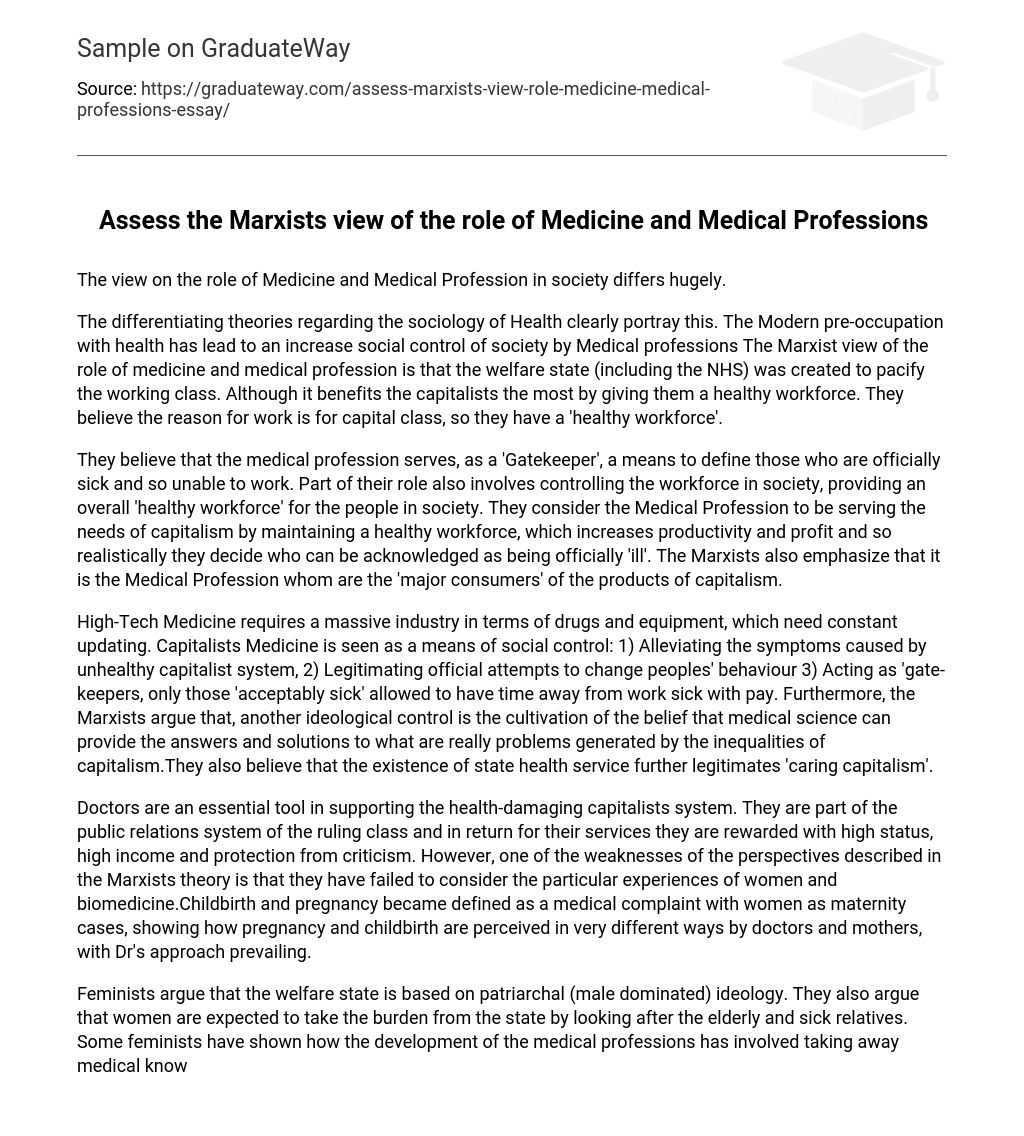The perspective on the role of Medicine and the Medical Profession in society varies greatly.
The sociology of Health encompasses various contrasting theories. One prominent theory highlights the growing emphasis on health in modern society, resulting in increased social control by the medical profession. On the other hand, the Marxist viewpoint argues that the welfare state and institutions like the NHS were established to appease the working class while ultimately benefiting the capitalist class through the availability of a healthy workforce. According to this perspective, the main purpose of work is to serve the interests of the capital class, ensuring the presence of a “healthy workforce”.
Marxists argue that the medical profession assumes the role of a ‘Gatekeeper’ in identifying individuals who are deemed officially unfit for work due to illness. They perceive this as a mechanism employed by capitalism to control the labor force and guarantee a healthy workforce for society. According to Marxists, the medical profession serves the interests of capitalism by preserving a robust workforce, ultimately boosting productivity and profit. Consequently, they possess the authority to determine who qualifies as officially ‘sick’. Furthermore, Marxists emphasize that the medical profession constitutes the primary consumer of capitalist goods.
High-Tech Medicine necessitates a considerable industry encompassing medications and equipment, which require consistent updates. Capitalist Medicine is perceived as a method of social control, with three main objectives:
- Alleviating symptoms resulting from an unhealthy capitalist system
- Legitimizing official attempts to alter people’s behavior
- Functioning as “gate-keepers” by only granting time off work with pay to those deemed “acceptably sick”
Additionally, Marxists argue that medical science is believed to hold the solutions to issues that are actually caused by the inequalities of capitalism. They also assert that the presence of a state health service further validates the concept of “caring capitalism.”
Doctors are integral to the health-damaging capitalist system, playing a crucial role as part of the ruling class’s public relations system. In return for their services, they receive prestigious status, generous income, and immunity from critique. However, it has been argued that Marxist theories often overlook the distinct experiences of women and the field of biomedicine. A prominent instance is the medicalization of childbirth and pregnancy, which portrays women as patients and maternity cases. This highlights the differing viewpoints between doctors and mothers, with medical professionals holding significant sway.
According to feminists, the welfare state is based on patriarchal principles and imposes the responsibility of caring for elderly and sick family members onto women, as representatives of the state. Moreover, certain feminists argue that advancements in medical professions have resulted in a dearth of medical knowledge among women. A prominent example of this can be seen in the higher representation of women in midwifery compared to men in obstetrics and gynecology.
According to proponents, the inductions of births and caesarean operations are frequently perceived as hospital convenience rather than benefiting both mother and baby. Additionally, functionalists differ from Marxists in their theory. Functionalist approach posits that “ill health” is a type of deviance regulated by society. They assert that managing the “sick roll” is crucial for maintaining society’s well-being.
The Doctor’s power over the patient is evident as the patient becomes passive. The Doctor’s authority stems from their knowledge, experience, and societal status, and as such they should be obeyed. According to interactionists, Doctors utilize symbols of the medical profession to control their interactions with patients through the concept of ‘labelling’. This theory suggests that individuals in lower social classes receive inferior treatment due to being labelled as uneducated and incapable of understanding explanations about their illness or proposed treatment, as discussed by Goffman in ‘Asylums’. In summary, all the theories indicate that Doctors play a crucial role in the ‘social control’ of society due to their significant power, high status, and expertise.
The Marxists theory suggests that the Doctors/Medical Professions serve as ‘gate-keepers’ for capitalism. Meanwhile, feminists argue that the Medical professions are rooted in patriarchal ideology. Interactionists, on the other hand, believe that Doctors label patients to display their power and high status, leaving patients vulnerable.





